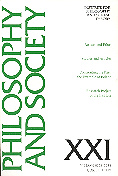REEXAMINING THE “SERBIAN EXCEPTIONALISM” THESIS
REEXAMINING THE “SERBIAN EXCEPTIONALISM” THESIS
Author(s): Veljko VujačićSubject(s): Politics / Political Sciences
Published by: Institut za filozofiju i društvenu teoriju
Keywords: Serbia; exceptionalism; explanation; historical legacy; political culture; tradition; political elites
Summary/Abstract: Although former Yugoslavia constituted what was widely held to be the most “promising” communist country in terms of potentials for economic reform and political democratization, Serbia remained the only East European country in which the former communist elite managed to defeat its opponents in a series of elections and preserve important elements of institutional and ideological continuity with the old system. Moreover, its regime played a conspicuous role in Yugoslavia’s violent collapse. In the specialist literature, the “Serbian exceptionalism” thesis has been elaborated in a number of forms. These are critically reviewed in the first part of the paper, classifying the paradigms according to whether they emphasize: 1) Serbian traditionalist, authoritarian, and collectivist political culture, 2) the affinity between traditional Serbian national populism, Russophile anti-Westernism, and communism, 3) the exclusivist and assimilationist character of Serbian nationalism, or 4) the appeals of the contemporary Serbian political elite led by S. Miloševiæ. In the second part of the paper an alternative explanation is presented that seeks to be both interpretively adequate and causally plausible. It rests on five basic factors: 1) historical legacy (the distinctive character of the Serbian collective historical experience and the relationship between Serbian and Yugoslav identities); 2) institutional analysis (the unintended consequences of communist federalism); 3) ideology (the revival of narratives of “Serbian victimization” by Serbian intellectuals); 4) leadership and social base (the peculiar nature of Miloševiæ’s appeals in the period of the terminal crisis of communism); and 5) the role of the diaspora (the perceived ethnic threat among Serbs in Croatia and Bosnia).
Journal: Filozofija i društvo
- Issue Year: 2002
- Issue No: 21
- Page Range: 205-246
- Page Count: 42
- Language: English

